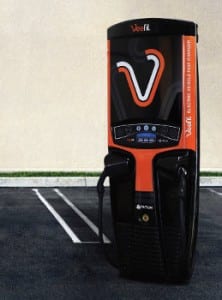Australian-designed EV-charging technology has slashed the time it takes to recharge an electric vehicle, achieving as much as 80 per cent battery capacity in under 30 minutes.
Queensland-based EV systems manufacturer Tritium, which evolved from an interest in providing solar racing powertrain solutions, launched its Veefil charging system in Brisbane on Wednesday – a technology it has realised with the help of a $1.15 million Early Stage Commercialisation grant through Commercialisation Australia.
On a website dedicated to the technology, the company says its Veefil fast charger can charge an electric vehicle 20 times faster than plugging it into the wall at home, and that just 10 minutes of charging will give EV drivers 50km of range.
“Reducing the charge time of an electric vehicle from eight hours to less than an hour is a game changer and will be a major boost for the electric car industry,” said parliamentary secretary for Climate Change, Industry and Innovation, Yvette D’Ath, speaking at the launch.
Tritium says the Veefil could be rolled out to hotels, carparks, airports and shopping centres, where easy and fast turnaround times on charging would be at a premium.
Designed for indoor and outdoor use – and compact enough to fit in most locations without too much hassle – it is also suitable to be installed in private household garages. It supports both major DC fast charging standards used by EV manufacturers.
“With all indications that demand for electric cars will grow significantly over the next decade, this places Tritium – a Brisbane-based manufacturer – in a prime position to capitalise on that growth,” said D’Ath.










